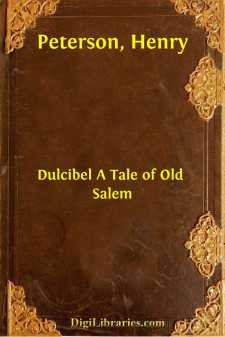Categories
- Antiques & Collectibles 13
- Architecture 36
- Art 48
- Bibles 22
- Biography & Autobiography 813
- Body, Mind & Spirit 142
- Business & Economics 28
- Children's Books 14
- Children's Fiction 11
- Computers 4
- Cooking 94
- Crafts & Hobbies 4
- Drama 346
- Education 46
- Family & Relationships 57
- Fiction 11829
- Games 19
- Gardening 17
- Health & Fitness 34
- History 1377
- House & Home 1
- Humor 147
- Juvenile Fiction 1873
- Juvenile Nonfiction 202
- Language Arts & Disciplines 88
- Law 16
- Literary Collections 686
- Literary Criticism 179
- Mathematics 13
- Medical 41
- Music 40
- Nature 179
- Non-Classifiable 1768
- Performing Arts 7
- Periodicals 1453
- Philosophy 64
- Photography 2
- Poetry 896
- Political Science 203
- Psychology 42
- Reference 154
- Religion 513
- Science 126
- Self-Help 84
- Social Science 81
- Sports & Recreation 34
- Study Aids 3
- Technology & Engineering 59
- Transportation 23
- Travel 463
- True Crime 29
Dulcibel A Tale of Old Salem
by: Henry Peterson
Description:
Excerpt
CHAPTER I.
Dulcibel Burton.
In the afternoon of a sunny Autumn day, nearly two hundred years ago, a young man was walking along one of the newly opened roads which led into Salem village, or what is now called Danvers Centre, in the then Province of Massachusetts Bay.
The town of Salem, that which is now the widely known city of that name, lay between four and five miles to the southeast, on a tongue of land formed by two inlets of the sea, called now as then North and South Rivers. Next to Plymouth it is the oldest town in New England, having been first settled in 1626. Not till three years after were Boston and Charlestown commenced by the arrival of eleven ships from England. It is a significant fact, as showing the hardships to which the early settlers were exposed, that of the fifteen hundred persons composing this Boston expedition, two hundred died during the first winter. Salem has also the honor of establishing the first New England church organization, in 1629, with the Reverend Francis Higginson as its pastor.
Salem village was an adjunct of Salem, the town taking in the adjacent lands for the purpose of tillage to a distance of six miles from the meeting-house. But in the progress of settlement, Salem village also became entitled to a church of its own; and it had one regularly established at the date of our story, with the Reverend Samuel Parris as presiding elder or minister.
There had been many bickerings and disputes before a minister could be found acceptable to all in Salem village. And the present minister was by no means a universal favorite. The principal point of contention on his part was the parsonage and its adjacent two acres of ground. Master Parris claimed that the church had voted him a free gift of these; while his opponents not only denied that it had been done, but that it lawfully could be done. This latter view was undoubtedly correct; for the parsonage land was a gift to the church, for the perpetual use of its pastor, whosoever he might be. But Master Parris would not listen to reason on this subject, and was not inclined to look kindly upon the men who steadfastly opposed him.
The inhabitants of Salem village were a goodly as well as godly people, but owing to these church differences about their ministers, as well as other disputes and lawsuits relative to the bounds of their respective properties, there was no little amount of ill feeling among them. Small causes in a village are just as effective as larger ones in a nation, in producing discord and strife; and the Puritans as a people were distinguished by all that determination to insist upon their rights, and that scorn of compromising difficulties, which men of earnest and honest but narrow natures have manifested in all ages of the world. Selfishness and uncharitableness are never so dangerous as when they assume the character of a conscientious devotion to the just and the true.
But all this time the young man has been walking almost due north from the meeting house in Salem village.
The road was not what would be called a good one in these days, for it was not much more than a bridle-path; the riding being generally at that time on horseback. But it was not the rather broken and uneven condition of the path which caused the frown on the young pedestrian's face, or the irritability shown by the sharp slashes of the maple switch in his hand upon the aspiring weeds along the roadside.
"If ever mortal man was so bothered," he muttered at last, coming to a stop. "Of course she is the best match, the other is below me, and has a spice of Satan in her; but then she makes the blood stir in a man. Ha!"
This exclamation came as he lifted his eyes from the ground, and gazed up the road before him. There, about half a mile distant, was a young woman riding toward him. Then she stopped her horse under a tree, and evidently was trying to break off a switch, while her horse pranced around in a most excited fashion. The horse at last starts in a rapid gallop. The young man sees that in trying to get the switch, she has allowed the bridle to get loose and over the horse's head, and can no longer control the fiery animal....


